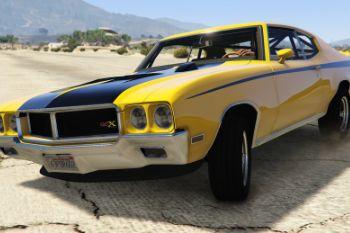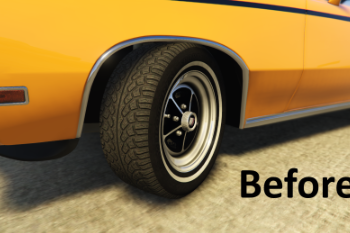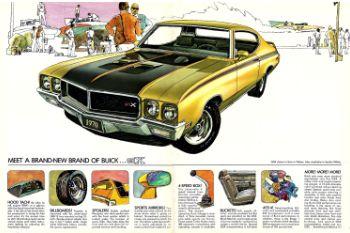Handling for Sam Mods' '70 Buick GSX Stage 1 2.0
1 398
36
1 398
36
This handling provides realistic top speed, power, gear ratios and center of gravity for Sam Mods 70 Buick GSX add on.
Get the car here: https://www.gta5-mods.com/vehicles/1970-buick-gsx-add-on-tuning-livery#comment-1233196
Version 2.0 (pending) finally makes a couple of important updates for realism now that I know how to do them including the ability to coast/free roll without throttle, removal of ABS which should not be on a classic of this era to begin with, fixed the stupid Rockstar wheelie update, major improvements to the general physics/handling behavior of the car were made and I've also included improved tire, brake rotor and underside textures to make the car look more realistic. The tire texture replaces the modern winter/gravel white wall tire with a black wall BFG more appropriate for a muscle car. The rotor texture is made from a picture of a stock Buick Skylark GSX brake rotor and fits the look of the stock wheel much better than the custom tuner looking rotors it had. The new underside texture slightly improves the bottom of the car in the event it is seen briefly in a jump or rollover etc.
I tried my best to make this car and Dragon777's Chevelle handle very similar to each other because they are sister cars in real life and are built on the same body/frame platform. In real life and in my handling files the Buick drives much better because it has better suspension, factory disc brakes, a lighter engine and better aerodynamics. However the Chevelle has more HP and a lower gear. The lower gearing means the Chevelle actually has less top speed despite the extra power but that low gearing gives it brutal acceleration which makes it ideal for drag racing. In short, the LS6 454 Chevelle is best suited for drag racing and the Buick GSX is a more expensive, more refined version that does everything else slightly better including top speed.
GSX 455 Stage 1
400 HP
120 MPH
5.8 Second 0-60 (or less if you can make it hook up)
Mid 13 to high 12 second quarter mile times.
With only 678 units produced and only two available colors (Saturn Yellow and Apollo White) the 1970 Buick GSX Stage 1 is one of the rarest, most sought after and most powerful muscle cars of all time. For 33 years it held the record of highest torque output rating of any production performance car until the 2003 Series 2 V10 Viper.
The stage 1 GSX's monster 455 cubic inch 7.4 liter V8 engine was conservatively rated at 360 HP at roughly 4500 RPM and a whopping 500 foot pounds of torque, although rumors developed and later dyno testing would prove it to be capable of producing 400 HP at roughly 5500 RPM (I will include a link to a dyno test video under the screenshots).
It soon became blatantly obvious to GSX Stage 1 owners that the engine produced more power than advertised as the peak power was advertised at roughly 4500 RPM while in reality automatic variants were programmed to shift at 5500 RPM. To achieve these impressive torque and HP numbers the "Stage 1" option consisted of special factory modified cylinder heads produced with much larger intake and exhaust valves and further modifications to increase the compression ratio.
In addition to a set of high flow-high compression cylinder heads the list of stage 1 engine upgrades also included a high lift camshaft, specially tuned distributor and specially tuned Rochester Quadrajet 4 barrel carburetor.
The GSX package added a hefty $1100 over the price of roughly $3500 for a base Buick GS, and included the iconic stripe package as well as some potent performance upgrades. These upgrades include dual hood scoops that were foam sealed to the air filter assembly allowing the 455 to breathe cool air to further increase engine output and throttle response. Front and rear spoilers providing minor but much needed aerodynamic improvements and a host of handling upgrades including power front disc brakes, stiff front and rear springs and shocks, front and rear sway bars and a quick ratio steering box.
Obviously these suspension improvements worked very well in conjunction with the front and rear spoiler helping the GSX hold the road much better than the Chevelle and GTO which shared nearly identical body and frame construction. The last Stage 1 specific performance upgrade was a heavy duty limited slip rear differential with a 3.64 final drive ratio. This low gearing and relatively low engine RPM would limit the cars top speed to just 120 MPH but it insured that both 3 speed automatic and 4 speed manual variants of the GSX Stage 1 were producing peak power just before the end of the quarter mile. The optional 4 speed would have very little affect on top speed as the extra gear was a mid range gear to improve acceleration and top gear was the same ratio for both the manual and the automatic. Of the 678 units produced only 199 of them were equipped with the close ratio four speed.
Tested by both Popular Mechanics and Motor Trend magazines in 1970 the 3 speed automatic was capable of a 5.8 second 0-60 time and 13.38 second quarter mile on the stock skinny bias ply tires! This was truly an impressive feat as vintage bias ply tires street tires are notorious for their terrible grip which can be compared to driving modern tires on wet pavement.
When equipped with a proper set of performance tires or simply raced at a fully prepped drag strip an otherwise stock GSX Stage 1 is capable of high 12 second runs and significantly improved 0-60 times.
Inverse power by IKT is a "must have" mod if you are sick of the game letting off the gas for you in the middle of a slide.: https://www.gta5-mods.com/scripts/inversepower
My realistic surface traction overhaul mod is another must have for a more challenging and realistic driving experience on all terrain types: https://www.gta5-mods.com/misc/realistic-road-grip-and-braking
Get the car here: https://www.gta5-mods.com/vehicles/1970-buick-gsx-add-on-tuning-livery#comment-1233196
Version 2.0 (pending) finally makes a couple of important updates for realism now that I know how to do them including the ability to coast/free roll without throttle, removal of ABS which should not be on a classic of this era to begin with, fixed the stupid Rockstar wheelie update, major improvements to the general physics/handling behavior of the car were made and I've also included improved tire, brake rotor and underside textures to make the car look more realistic. The tire texture replaces the modern winter/gravel white wall tire with a black wall BFG more appropriate for a muscle car. The rotor texture is made from a picture of a stock Buick Skylark GSX brake rotor and fits the look of the stock wheel much better than the custom tuner looking rotors it had. The new underside texture slightly improves the bottom of the car in the event it is seen briefly in a jump or rollover etc.
I tried my best to make this car and Dragon777's Chevelle handle very similar to each other because they are sister cars in real life and are built on the same body/frame platform. In real life and in my handling files the Buick drives much better because it has better suspension, factory disc brakes, a lighter engine and better aerodynamics. However the Chevelle has more HP and a lower gear. The lower gearing means the Chevelle actually has less top speed despite the extra power but that low gearing gives it brutal acceleration which makes it ideal for drag racing. In short, the LS6 454 Chevelle is best suited for drag racing and the Buick GSX is a more expensive, more refined version that does everything else slightly better including top speed.
GSX 455 Stage 1
400 HP
120 MPH
5.8 Second 0-60 (or less if you can make it hook up)
Mid 13 to high 12 second quarter mile times.
With only 678 units produced and only two available colors (Saturn Yellow and Apollo White) the 1970 Buick GSX Stage 1 is one of the rarest, most sought after and most powerful muscle cars of all time. For 33 years it held the record of highest torque output rating of any production performance car until the 2003 Series 2 V10 Viper.
The stage 1 GSX's monster 455 cubic inch 7.4 liter V8 engine was conservatively rated at 360 HP at roughly 4500 RPM and a whopping 500 foot pounds of torque, although rumors developed and later dyno testing would prove it to be capable of producing 400 HP at roughly 5500 RPM (I will include a link to a dyno test video under the screenshots).
It soon became blatantly obvious to GSX Stage 1 owners that the engine produced more power than advertised as the peak power was advertised at roughly 4500 RPM while in reality automatic variants were programmed to shift at 5500 RPM. To achieve these impressive torque and HP numbers the "Stage 1" option consisted of special factory modified cylinder heads produced with much larger intake and exhaust valves and further modifications to increase the compression ratio.
In addition to a set of high flow-high compression cylinder heads the list of stage 1 engine upgrades also included a high lift camshaft, specially tuned distributor and specially tuned Rochester Quadrajet 4 barrel carburetor.
The GSX package added a hefty $1100 over the price of roughly $3500 for a base Buick GS, and included the iconic stripe package as well as some potent performance upgrades. These upgrades include dual hood scoops that were foam sealed to the air filter assembly allowing the 455 to breathe cool air to further increase engine output and throttle response. Front and rear spoilers providing minor but much needed aerodynamic improvements and a host of handling upgrades including power front disc brakes, stiff front and rear springs and shocks, front and rear sway bars and a quick ratio steering box.
Obviously these suspension improvements worked very well in conjunction with the front and rear spoiler helping the GSX hold the road much better than the Chevelle and GTO which shared nearly identical body and frame construction. The last Stage 1 specific performance upgrade was a heavy duty limited slip rear differential with a 3.64 final drive ratio. This low gearing and relatively low engine RPM would limit the cars top speed to just 120 MPH but it insured that both 3 speed automatic and 4 speed manual variants of the GSX Stage 1 were producing peak power just before the end of the quarter mile. The optional 4 speed would have very little affect on top speed as the extra gear was a mid range gear to improve acceleration and top gear was the same ratio for both the manual and the automatic. Of the 678 units produced only 199 of them were equipped with the close ratio four speed.
Tested by both Popular Mechanics and Motor Trend magazines in 1970 the 3 speed automatic was capable of a 5.8 second 0-60 time and 13.38 second quarter mile on the stock skinny bias ply tires! This was truly an impressive feat as vintage bias ply tires street tires are notorious for their terrible grip which can be compared to driving modern tires on wet pavement.
When equipped with a proper set of performance tires or simply raced at a fully prepped drag strip an otherwise stock GSX Stage 1 is capable of high 12 second runs and significantly improved 0-60 times.
Inverse power by IKT is a "must have" mod if you are sick of the game letting off the gas for you in the middle of a slide.: https://www.gta5-mods.com/scripts/inversepower
My realistic surface traction overhaul mod is another must have for a more challenging and realistic driving experience on all terrain types: https://www.gta5-mods.com/misc/realistic-road-grip-and-braking
Dodano: czerwiec 01, 2018
Ostatnia aktualizacja: wrzesień 11, 2020
Last Downloaded: luty 21, 2025
8 Komentarzy
More mods by Impactjunky:
This handling provides realistic top speed, power, gear ratios and center of gravity for Sam Mods 70 Buick GSX add on.
Get the car here: https://www.gta5-mods.com/vehicles/1970-buick-gsx-add-on-tuning-livery#comment-1233196
Version 2.0 (pending) finally makes a couple of important updates for realism now that I know how to do them including the ability to coast/free roll without throttle, removal of ABS which should not be on a classic of this era to begin with, fixed the stupid Rockstar wheelie update, major improvements to the general physics/handling behavior of the car were made and I've also included improved tire, brake rotor and underside textures to make the car look more realistic. The tire texture replaces the modern winter/gravel white wall tire with a black wall BFG more appropriate for a muscle car. The rotor texture is made from a picture of a stock Buick Skylark GSX brake rotor and fits the look of the stock wheel much better than the custom tuner looking rotors it had. The new underside texture slightly improves the bottom of the car in the event it is seen briefly in a jump or rollover etc.
I tried my best to make this car and Dragon777's Chevelle handle very similar to each other because they are sister cars in real life and are built on the same body/frame platform. In real life and in my handling files the Buick drives much better because it has better suspension, factory disc brakes, a lighter engine and better aerodynamics. However the Chevelle has more HP and a lower gear. The lower gearing means the Chevelle actually has less top speed despite the extra power but that low gearing gives it brutal acceleration which makes it ideal for drag racing. In short, the LS6 454 Chevelle is best suited for drag racing and the Buick GSX is a more expensive, more refined version that does everything else slightly better including top speed.
GSX 455 Stage 1
400 HP
120 MPH
5.8 Second 0-60 (or less if you can make it hook up)
Mid 13 to high 12 second quarter mile times.
With only 678 units produced and only two available colors (Saturn Yellow and Apollo White) the 1970 Buick GSX Stage 1 is one of the rarest, most sought after and most powerful muscle cars of all time. For 33 years it held the record of highest torque output rating of any production performance car until the 2003 Series 2 V10 Viper.
The stage 1 GSX's monster 455 cubic inch 7.4 liter V8 engine was conservatively rated at 360 HP at roughly 4500 RPM and a whopping 500 foot pounds of torque, although rumors developed and later dyno testing would prove it to be capable of producing 400 HP at roughly 5500 RPM (I will include a link to a dyno test video under the screenshots).
It soon became blatantly obvious to GSX Stage 1 owners that the engine produced more power than advertised as the peak power was advertised at roughly 4500 RPM while in reality automatic variants were programmed to shift at 5500 RPM. To achieve these impressive torque and HP numbers the "Stage 1" option consisted of special factory modified cylinder heads produced with much larger intake and exhaust valves and further modifications to increase the compression ratio.
In addition to a set of high flow-high compression cylinder heads the list of stage 1 engine upgrades also included a high lift camshaft, specially tuned distributor and specially tuned Rochester Quadrajet 4 barrel carburetor.
The GSX package added a hefty $1100 over the price of roughly $3500 for a base Buick GS, and included the iconic stripe package as well as some potent performance upgrades. These upgrades include dual hood scoops that were foam sealed to the air filter assembly allowing the 455 to breathe cool air to further increase engine output and throttle response. Front and rear spoilers providing minor but much needed aerodynamic improvements and a host of handling upgrades including power front disc brakes, stiff front and rear springs and shocks, front and rear sway bars and a quick ratio steering box.
Obviously these suspension improvements worked very well in conjunction with the front and rear spoiler helping the GSX hold the road much better than the Chevelle and GTO which shared nearly identical body and frame construction. The last Stage 1 specific performance upgrade was a heavy duty limited slip rear differential with a 3.64 final drive ratio. This low gearing and relatively low engine RPM would limit the cars top speed to just 120 MPH but it insured that both 3 speed automatic and 4 speed manual variants of the GSX Stage 1 were producing peak power just before the end of the quarter mile. The optional 4 speed would have very little affect on top speed as the extra gear was a mid range gear to improve acceleration and top gear was the same ratio for both the manual and the automatic. Of the 678 units produced only 199 of them were equipped with the close ratio four speed.
Tested by both Popular Mechanics and Motor Trend magazines in 1970 the 3 speed automatic was capable of a 5.8 second 0-60 time and 13.38 second quarter mile on the stock skinny bias ply tires! This was truly an impressive feat as vintage bias ply tires street tires are notorious for their terrible grip which can be compared to driving modern tires on wet pavement.
When equipped with a proper set of performance tires or simply raced at a fully prepped drag strip an otherwise stock GSX Stage 1 is capable of high 12 second runs and significantly improved 0-60 times.
Inverse power by IKT is a "must have" mod if you are sick of the game letting off the gas for you in the middle of a slide.: https://www.gta5-mods.com/scripts/inversepower
My realistic surface traction overhaul mod is another must have for a more challenging and realistic driving experience on all terrain types: https://www.gta5-mods.com/misc/realistic-road-grip-and-braking
Get the car here: https://www.gta5-mods.com/vehicles/1970-buick-gsx-add-on-tuning-livery#comment-1233196
Version 2.0 (pending) finally makes a couple of important updates for realism now that I know how to do them including the ability to coast/free roll without throttle, removal of ABS which should not be on a classic of this era to begin with, fixed the stupid Rockstar wheelie update, major improvements to the general physics/handling behavior of the car were made and I've also included improved tire, brake rotor and underside textures to make the car look more realistic. The tire texture replaces the modern winter/gravel white wall tire with a black wall BFG more appropriate for a muscle car. The rotor texture is made from a picture of a stock Buick Skylark GSX brake rotor and fits the look of the stock wheel much better than the custom tuner looking rotors it had. The new underside texture slightly improves the bottom of the car in the event it is seen briefly in a jump or rollover etc.
I tried my best to make this car and Dragon777's Chevelle handle very similar to each other because they are sister cars in real life and are built on the same body/frame platform. In real life and in my handling files the Buick drives much better because it has better suspension, factory disc brakes, a lighter engine and better aerodynamics. However the Chevelle has more HP and a lower gear. The lower gearing means the Chevelle actually has less top speed despite the extra power but that low gearing gives it brutal acceleration which makes it ideal for drag racing. In short, the LS6 454 Chevelle is best suited for drag racing and the Buick GSX is a more expensive, more refined version that does everything else slightly better including top speed.
GSX 455 Stage 1
400 HP
120 MPH
5.8 Second 0-60 (or less if you can make it hook up)
Mid 13 to high 12 second quarter mile times.
With only 678 units produced and only two available colors (Saturn Yellow and Apollo White) the 1970 Buick GSX Stage 1 is one of the rarest, most sought after and most powerful muscle cars of all time. For 33 years it held the record of highest torque output rating of any production performance car until the 2003 Series 2 V10 Viper.
The stage 1 GSX's monster 455 cubic inch 7.4 liter V8 engine was conservatively rated at 360 HP at roughly 4500 RPM and a whopping 500 foot pounds of torque, although rumors developed and later dyno testing would prove it to be capable of producing 400 HP at roughly 5500 RPM (I will include a link to a dyno test video under the screenshots).
It soon became blatantly obvious to GSX Stage 1 owners that the engine produced more power than advertised as the peak power was advertised at roughly 4500 RPM while in reality automatic variants were programmed to shift at 5500 RPM. To achieve these impressive torque and HP numbers the "Stage 1" option consisted of special factory modified cylinder heads produced with much larger intake and exhaust valves and further modifications to increase the compression ratio.
In addition to a set of high flow-high compression cylinder heads the list of stage 1 engine upgrades also included a high lift camshaft, specially tuned distributor and specially tuned Rochester Quadrajet 4 barrel carburetor.
The GSX package added a hefty $1100 over the price of roughly $3500 for a base Buick GS, and included the iconic stripe package as well as some potent performance upgrades. These upgrades include dual hood scoops that were foam sealed to the air filter assembly allowing the 455 to breathe cool air to further increase engine output and throttle response. Front and rear spoilers providing minor but much needed aerodynamic improvements and a host of handling upgrades including power front disc brakes, stiff front and rear springs and shocks, front and rear sway bars and a quick ratio steering box.
Obviously these suspension improvements worked very well in conjunction with the front and rear spoiler helping the GSX hold the road much better than the Chevelle and GTO which shared nearly identical body and frame construction. The last Stage 1 specific performance upgrade was a heavy duty limited slip rear differential with a 3.64 final drive ratio. This low gearing and relatively low engine RPM would limit the cars top speed to just 120 MPH but it insured that both 3 speed automatic and 4 speed manual variants of the GSX Stage 1 were producing peak power just before the end of the quarter mile. The optional 4 speed would have very little affect on top speed as the extra gear was a mid range gear to improve acceleration and top gear was the same ratio for both the manual and the automatic. Of the 678 units produced only 199 of them were equipped with the close ratio four speed.
Tested by both Popular Mechanics and Motor Trend magazines in 1970 the 3 speed automatic was capable of a 5.8 second 0-60 time and 13.38 second quarter mile on the stock skinny bias ply tires! This was truly an impressive feat as vintage bias ply tires street tires are notorious for their terrible grip which can be compared to driving modern tires on wet pavement.
When equipped with a proper set of performance tires or simply raced at a fully prepped drag strip an otherwise stock GSX Stage 1 is capable of high 12 second runs and significantly improved 0-60 times.
Inverse power by IKT is a "must have" mod if you are sick of the game letting off the gas for you in the middle of a slide.: https://www.gta5-mods.com/scripts/inversepower
My realistic surface traction overhaul mod is another must have for a more challenging and realistic driving experience on all terrain types: https://www.gta5-mods.com/misc/realistic-road-grip-and-braking
Dodano: czerwiec 01, 2018
Ostatnia aktualizacja: wrzesień 11, 2020
Last Downloaded: luty 21, 2025
![Killdozer [Menyoo] Killdozer [Menyoo]](https://img.gta5-mods.com/q75-w500-h333-cfill/images/killdozer-menyoo/a322cf-Grand Theft Auto V 10_27_2016 9_31_27 PM.png)














 5mods on Discord
5mods on Discord
This file has been approved automatically. If you think this file should not be here for any reason please report it.
Good
@sam mods Thanks for the cool car dude!
@Impactjunky screenshots inspired driver 2 secret car?
https://www.beamng.com/attachments/upload_2016-12-6_7-21-30-png.205347/
@Lozano71 Good eyes, the secret car in Chicago in Driver 2 was based on the Buick GSX.
Great work as always!
@Dirk69 Thanks dude!
@Impactjunky - could you please make proper handling for this 442:
https://www.gta5-mods.com/vehicles/oldsmobile-442-1970-replace-tuning#description_tab